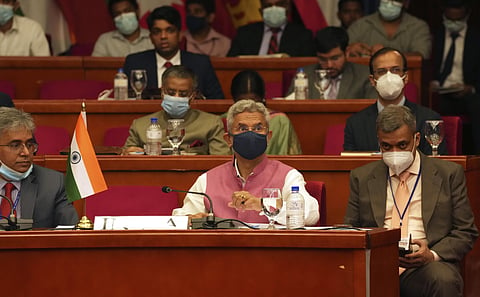

COLOMBO: External Affairs Minister S Jaishankar has welcomed the first interaction between Sri Lanka's Tamil leaders with President Gotabaya Rajapaksa as "positive developments", saying India was consistently supportive of the realisation of their aspirations for equality, justice, peace and dignity within the framework of a united Sri Lanka.
Jaishankar, who arrived here on Sunday night to hold bilateral talks with Sri Lanka's top leadership and attend the seven-nation BIMSTEC summit, met the main Tamil party - the Tamil National Alliance (TNA) - delegation led by R Sampanthan and Tamil Progressive Alliance (TPA) leaders on Monday.
The TNA delegation briefed Jaishankar of the latest developments, focusing on the March 25 meeting between the Government and the TNA, according to a press release issued by the High Commission of India here.
They conveyed that the issues of release of political prisoners, land utilization, missing persons, 13th Amendment implementation and diaspora investment were discussed in the meeting with the Lankan president, the release added.
The TNA and government met for talks last week for the first time since 2019.
The government's engagement with the TNA also came up during Jaishankar's call on President Gotabaya Rajapaksa on Monday.
The minister received a more detailed understanding on this subject from Lankan counterpart Prof. G. L. Peiris.
Jaishankar "welcomed in all these interactions the positive developments regarding the issues on the Government-TNA agenda. He emphasised that the Government of India was consistently supportive of the realisation of the aspirations of the Tamils of Sri Lanka for equality, justice, peace and dignity within the framework of a united Sri Lanka," the release said.
"The contribution of India's development partnership to economic recovery in the North and East was also recognised in all the meetings," it said, adding that Jaishankar expressed particular satisfaction at the virtual inauguration of the Jaffna Cultural Centre that he did along with Prime Minister Mahinda Rajapaksa.
Jaishankar had also met Tamil Progressive Alliance (TPA) leaders - Mano Ganeshan, Thigambaram, V Radhakrishnan, Uday Kumar - and discussed the socio-economic issues of the Indian origin Tamil community in Sri Lanka.
On Friday, President Rajapaksa had sought cooperation from the minority Tamil community leaders to "rebuild the country" in his first interaction with them since assuming office over two years ago.
"Let's work together to rebuild the country," President Rajapaksa told the leaders of the TNA who called on him at the Presidential Secretariat here on Friday.
During more than two-hour long talks, the President had pointed out that attention was paid on further steps to be taken with regard to those who are held in long-term detention, release of lands that have been previously used for cultivation, investigation of missing persons, discussion of amendments to the new Constitution after translating into Tamil and Sinhala, and the establishment of a North-East Development Fund.
The TNA wants full devolution under the 13th Amendment as the central governments have over the years shown reluctance to meet the demand for police and land powers to the provinces.
The 13th Amendment provides for devolution of power to the Tamil community.
India has been pressing Sri Lanka to implement the 13th Amendment which was brought in after the Indo-Sri Lankan agreement of 1987.
The Sinhala majority hardliners of the ruling Sri Lanka People's Party (SLPP) have been advocating a total abolition of the island's provincial council system established in 1987.